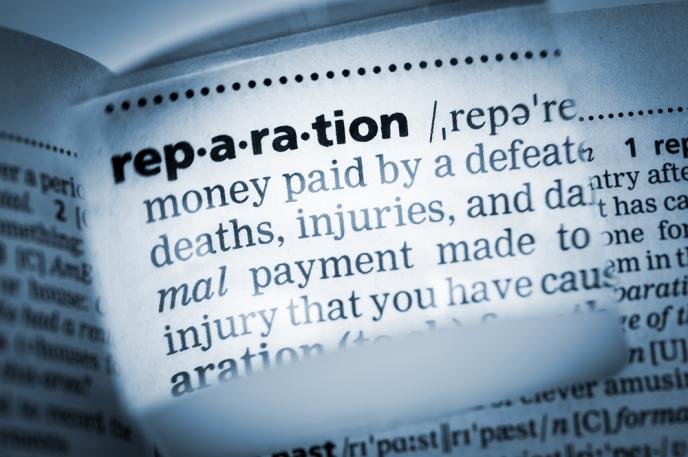This blog was written by Lawrence Turner, adult services librarian at South County Regional Library
When people think about reparations, they immediately think about people who've been dead for 100 years, said bestselling writer Ta-Nehisi Coates. He writes that attitude should change. Clearly understanding reparations is the way to start.
Reparations is defined as making amends for a past wrongdoing by apology, money, or otherwise. The challenge to enact the concept is to take a long view to understand and to take appropriate actions. As such, the United States would have to make major concessions for its generations-long practice of slavery.
Attempts to rectify the enslavement of African Americans with their descendants were enacted with government policies during Reconstruction, after slavery’s official end. The endeavor was short-lived and was replaced with decades of Jim Crow laws. Returning to Coates’ position, he wrote in his book, We Were Eight Years in Power: An American Tragedy, reparations would lead the nation to a spiritual renewal. Undertaking a “full acceptance of our collective biography and its consequences—is the price to see ourselves squarely.”
To the question if the act would cause division, he answered the country is already split by a wealth gap acquired without comment. The result is “that American prosperity was ill gotten and selective in its distribution. What is needed is an airing of family secrets, a settling with old ghosts…a healing of the American psyche and the banishment of white guilt.”
Of course, reparations could not take place without strong public support. It is not there. That the issue of reparations has lingered for many years can be attributable to racial differences.
The Pew Research Center in a 2021 poll found 77 percent of Black Americans favored some form of reparation for descendants of enslaved people while white support was at 18 percent.
A Public Radio article in 2023 echoed the Pew Research Center polls. Yale social psychologist Michael Kraus said, "A majority of our sample (research published in an academic journal) tends to think that we've made steady progress towards greater equality in wealth between families, so between black and white families…That is totally inconsistent with reality." In contrast, some communities concede inequality is a concern with examples in the state of California and a dozen cities nationwide. They are hosting initiatives to promote federal reparations.
The Library has several titles covering this issue with historical and political accounts but one new book approaches it as a fiction story. Acts of Forgiveness is a new novel released this year about a new federal reparation program and the impact it has on one family. In an essay about the book, writer Maura Cheeks wrote, “The idea that the United States could ever collectively support a national reparations policy for Black people seemed, well, the stuff of fiction.”
She decided to write about reparations after researching the racial wealth gap with its startling statistics. Cheeks essay included, “the Federal Reserve’s 2022 Survey Consumer Finances (found) the typical white family has about six times as much wealth as the typical Black family, despite the fact that between 2019 and 2022 the typical Black family’s wealth rose at about twice the rate of the typical white family’s during that same period.”
Debates and arguments in print about this complex topic may be found in this booklist.

